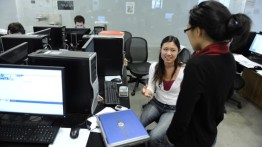Cooper Union Admissions Highly Competitive for Fall 2012
POSTED ON: April 2, 2012

Cooper Union accepted just 6.2% of freshman applicants this year, making it one of the most selective colleges in the country. That admissions rate was even more competitive than last year, when 7.7% freshmen applicants were accepted.
Cooper Union is in league with other highly competitive institutions such as Harvard, which admitted 5.9% of freshman applicants for Fall 2012. Cooper is more selective than both Yale (6.8%) and Princeton (7.9%) this year.
Applications to the Albert Nerken School of Engineering were especially strong with a 11.8% increase over last year’s numbers. The Irwin S. Chanin School of Architecture likewise saw an increase of applications by a 7% magnitude.
The new statistics reflect a sustained increase in freshman applications at Cooper Union over the past decade. This year 3,556 applications were received by Cooper Union, a 4.1% increase over 2011, when 3,415 applications were received. This was a 39.4% increase from five years ago (2007) when 2,551 applications were received and a 74.2% increase over applications received ten years ago (2002) when 2,041 were received.
Admission to Cooper varies between the three schools, but is a rigorous and unique experience for all applicants. Hopeful students need to have particularly strong academic credentials from their pre-college experience, including exceptional performance on standardized tests like the SAT I and SAT II. High school performance is especially demanding of engineering applicants, who must also answer fifteen short answer or essay questions as part of the admissions process, demonstrating writing and critical thinking skills. Art and architecture applicants meanwhile complete an extensive home test, developed by each school to evaluate creative problem solving abilities.
Dean of Admissions Mitchell Lipton attributes this year’s increased applicant pool to increased outreach and involvement with the pre-college community, as well as Cooper Union’s active public programming.




